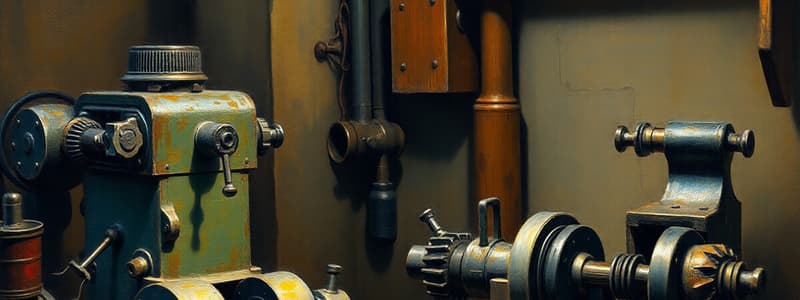Podcast
Questions and Answers
What is the primary purpose of the EMMS?
What is the primary purpose of the EMMS?
- To prepare specimens for testing and machining tools (correct)
- To assemble electronic devices
- To manufacture cutting tools
- To conduct electrical tests on machinery
Which of the following tools is considered a single point cutting tool?
Which of the following tools is considered a single point cutting tool?
- Milling cutter
- Drill bit
- Grinding wheel
- Boring tool (correct)
What characterizes a multipoint cutting tool?
What characterizes a multipoint cutting tool?
- It includes tools like lathe tools.
- It can have multiple cutting edges. (correct)
- It has only one cutting edge.
- It is exclusively used for grinding.
What occurs during the chip removal process?
What occurs during the chip removal process?
Which type of chip is produced when the cutting action is continuous and causes a built-up edge?
Which type of chip is produced when the cutting action is continuous and causes a built-up edge?
What is the key characteristic of the turning process?
What is the key characteristic of the turning process?
In milling, what is the role of the milling cutter?
In milling, what is the role of the milling cutter?
What best describes a turret lathe's purpose?
What best describes a turret lathe's purpose?
What differentiates continuous chips from discontinuous chips?
What differentiates continuous chips from discontinuous chips?
What actions are performed during grinding?
What actions are performed during grinding?
Flashcards
What is EMMS?
What is EMMS?
Short for Electrical Mechanical Machine Shop, it's where tools are prepared, specimens are made for testing, and parts like wheel cross sections are shaped. It involves processes like grinding, turning, and milling.
What is a single point cutting tool?
What is a single point cutting tool?
A type of cutting tool with one cutting edge, used to shape metal by removing excess material. Examples include lathe tools and shaper tools.
What is a multipoint cutting tool?
What is a multipoint cutting tool?
A cutting tool with multiple cutting edges, used in operations like milling, drilling, and reaming. Examples include milling cutters and drill bits.
What is the chip removal process?
What is the chip removal process?
Signup and view all the flashcards
What is turning?
What is turning?
Signup and view all the flashcards
What is a turret lathe?
What is a turret lathe?
Signup and view all the flashcards
What is milling?
What is milling?
Signup and view all the flashcards
What is a milling cutter?
What is a milling cutter?
Signup and view all the flashcards
What is machining?
What is machining?
Signup and view all the flashcards
What is a spindle?
What is a spindle?
Signup and view all the flashcards
Study Notes
EMMS (Electrical Mechanical Machine Shop)
- EMMS is an abbreviation for Electrical Mechanical Machine Shop
- This shop prepares specimens for testing
- Machining tools and cross-sections of wheels are created here
- Operations performed include grinding, turning, milling, and finishing
Tools
- Single Point Cutting Tool: A simple tool with a single cutting edge to remove excess material from a workpiece
- Examples include lathe tools (chamfering, parting, facing), shaper tools, planer tools, and boring tools
- Terminology of Single Point Cutting Tool: Includes terms like side rake angle, end cutting edge angle, face, end flank, axis, back rake angle, side relief angle, base, side cutting edge angle, and end relief angle. (Refer to diagram for visual representation)
- Multipoint Cutting Tool: A tool with more than one cutting edge
- Examples include milling cutters, drill bits, reamers, broachers, and grinding wheels
Chip Removal Process
- When a cutting tool interacts with a workpiece, a compressive force is exerted
- This force stresses the workpiece beyond its yield point, causing plastic deformation and shearing
- Sheared material flows along the cutting tool face in the form of small chips
- There are three types of chips
- Continuous chips
- Continuous chips with built-up edge
- Discontinuous chips
Turning (Lathe)
- Turning is a machining process to create external cylindrical and conical surfaces on a rotating workpiece
- A single-point cutting tool traverses the workpiece on a lathe
- Turret lathes are for preparing cope and drag molds
Milling
- Milling is a manufacturing process using a rotating multi-point cutting tool (milling cutter) to remove excess material
- The cutter rotates, and the workpiece is fed against it
- Milling machines are useful for small-to-medium jobs, creating flat, angular, or curved surfaces, threads, gears, keyways, slots, and more
Grinding
- Grinding removes excess workpiece material using abrasive particles bonded to a rotating wheel (grinding wheel)
- The wheel rotates at high speed, and contact with the workpiece creates fine chips
- The process is downward, creating a finishing process.
- Grinding yields high accuracy and surface finish compared to other processes like turning and milling.
Studying That Suits You
Use AI to generate personalized quizzes and flashcards to suit your learning preferences.
Related Documents
Description
Test your knowledge on the operations and tools used in the Electrical Mechanical Machine Shop. This quiz covers various machining processes, single and multipoint cutting tools, and chip removal methods relevant to the field. Perfect for students and professionals looking to refresh their skills!




